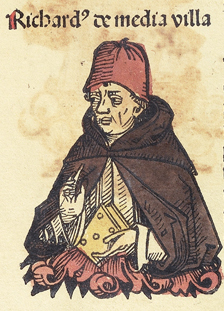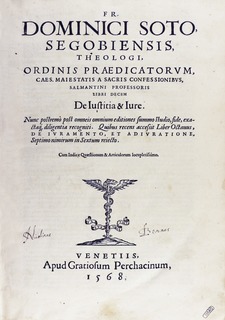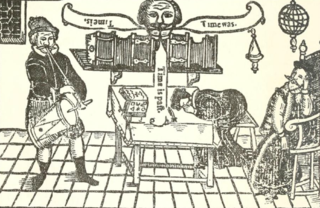
Alexander of Hales, also called Doctor Irrefragibilis and Theologorum Monarcha, was a theologian and philosopher important in the development of Scholasticism and of the Franciscan School.

Roger Bacon, also known by the scholastic accolade Doctor Mirabilis, was a medieval English philosopher and Franciscan friar who placed considerable emphasis on the study of nature through empiricism. In the early modern era, he was regarded as a wizard and particularly famed for the story of his mechanical or necromantic brazen head. He is sometimes credited as one of the earliest European advocates of the modern scientific method inspired by Aristotle and by Alhazen.

William of Ockham was an English Franciscan friar, scholastic philosopher, and theologian, who is believed to have been born in Ockham, a small village in Surrey. He is considered to be one of the major figures of medieval thought and was at the centre of the major intellectual and political controversies of the 14th century. He is commonly known for Occam's razor, the methodological principle that bears his name, and also produced significant works on logic, physics, and theology,. In the Church of England, his day of commemoration is 10 April.

Scholasticism is a method of critical thought which dominated teaching by the academics of medieval universities in Europe from about 1100 to 1700, and a program of employing that method in articulating and defending dogma in an increasingly pluralistic context. It originated as an outgrowth of and a departure from Christian theology within the monastic schools at the earliest European universities. The rise of scholasticism was closely associated with the rise of the 12th and 13th century schools that developed into the earliest modern universities, including those in Italy, France, Spain and England.

The Franciscans are a group of related mendicant religious orders within the Catholic Church, founded in 1209 by Saint Francis of Assisi. These orders include the Order of Friars Minor, the Order of Saint Clare, and the Third Order of Saint Francis. They adhere to the teachings and spiritual disciplines of the founder and of his main associates and followers, such as Clare of Assisi, Anthony of Padua, and Elizabeth of Hungary, among many others.

John Peckham was Archbishop of Canterbury in the years 1279–1292. He was a native of Sussex who was educated at Lewes Priory and became a Friar Minor about 1250. He studied at the University of Paris under Bonaventure, where he would later teach theology. From his teaching, he came into conflict with Thomas Aquinas, with whom he debated on two occasions. Known as a conservative theologian, he opposed Aquinas' views on the nature of the soul. Peckham also studied optics and astronomy, and his studies in those subjects were influenced by Roger Bacon.

The nativity of Jesus or birth of Jesus is the basis for the Christian holiday of Christmas and is described in the gospels of Luke and Matthew. The two accounts differ, but agree that Jesus was born in Bethlehem in Judea during the reign of King Herod the Great, his mother Mary was married to a man named Joseph, who was descended from King David and was not his biological father, and that his birth was caused by divine intervention. Luke's version says the birth took place during a Roman census, mentions an announcement to shepherds by angels, presentation of Jesus in the Temple, and gives the name of the angel who announces the coming birth to Mary. Matthew's version mentions the arrival of the Magi, the flight into Egypt by the family, and the Massacre of the Innocents by King Herod. The consensus of scholars is that both gospels were written about AD 75-85, and while it is possible that one account might be based on the other, or that the two share common source material, the majority conclusion is that the two nativity narratives are independent of each other.

Richard of Middleton (c.1249–c.1308) was a member of the Franciscan Order, a theologian, and scholastic philosopher.
The Oxford Franciscan school was the name given to a group of scholastic philosophers that, in the context of the Renaissance of the 12th century, gave special contribution to the development of science and scientific methodology during the High Middle Ages. This group includes such names as Robert Grosseteste, Roger Bacon, Duns Scotus and William of Ockham as well as Thomas of York, John Peckham, and Richard of Middleton.

Domingo de Soto was a Dominican priest and Scholastic theologian born in Segovia, Spain, and died in Salamanca at the age of 66. He is best known as one of the founders of international law and of the Spanish Thomistic philosophical and theological movement known as the School of Salamanca.
Henry (of) Harclay was an English medieval philosopher and university chancellor.
Adam of Wodeham, OFM (1298–1358) was a philosopher and theologian. Currently, Wodeham is best known for having been a secretary of William Ockham and for his interpretations of John Duns Scotus. Despite this associational fame, Wodeham was an influential thinker who made valuable philosophical contributions during his life.
Roger Weseham was an English medieval Bishop of Coventry and Lichfield.
Gerard of Abbeville (1220-1272) was a theologian from the University of Paris. He formally became a theologian in 1257 and from then was known as an opponent of the mendicant orders, particularly in the second stage of the conflict, taking part in a concerted attack that temporarily affected their privileges.
John of Reading was an English Franciscan theologian and scholastic philosopher. He was an early opponent of William of Ockham, and a follower of Duns Scotus. He wrote a commentary on the Sentences around 1320, at the University of Oxford. He argued for the unity of science.

Medieval philosophy is a term used to refer to the philosophy that existed through the Middle Ages, the period roughly extending from the fall of the Western Roman Empire in the 5th century to the Renaissance in the 15th century. Medieval philosophy, understood as a project of independent philosophical inquiry, began in Baghdad, in the middle of the 8th century, and in France, in the itinerant court of Charlemagne, in the last quarter of the 8th century. It is defined partly by the process of rediscovering the ancient culture developed in Greece and Rome during the Classical period, and partly by the need to address theological problems and to integrate sacred doctrine with secular learning.

John Duns, commonly called Duns Scotus, a Scotsman, is generally considered to be one of the three most important philosopher-theologians of Western Europe in the High Middle Ages, together with Thomas Aquinas and William of Ockham. Scotus has had considerable influence on both Catholic and secular thought. The doctrines for which he is best known are the "univocity of being", that existence is the most abstract concept we have, applicable to everything that exists; the formal distinction, a way of distinguishing between different aspects of the same thing; and the idea of haecceity, the property supposed to be in each individual thing that makes it an individual. Scotus also developed a complex argument for the existence of God, and argued for the Immaculate Conception of Mary.

Erasmus Middleton (1739–1805) was an English clergyman, author and editor.

Thomas Bungay, also known as Thomas of Bungay and formerly also known as Friar Bongay, was an English Franciscan friar, scholar, and alchemist.
















